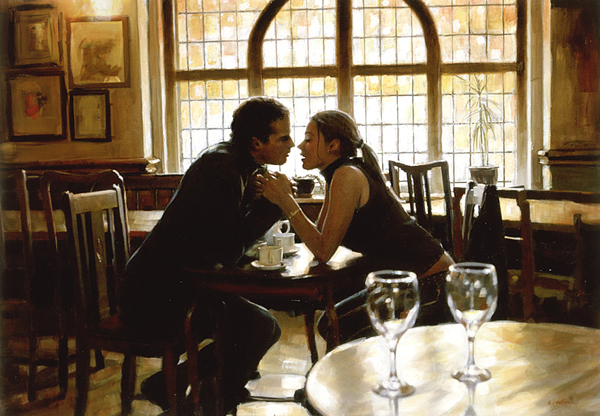Madly in Love
 When a man or woman is utterly obsessed with another, there is the possibility of becoming madly in love. To love anyone or anything in existence is extremely dangerous. There are innumerable accounts of people who have been so in love that they have literally gone mad, perhaps through an unrequited love or the death of the beloved. Madness is to be vulnerable or, in extremes, possessed by an unconscious force that influences the behaviour and psychological condition of the mind. Love is a state of supreme beauty and simplicity. So to be madly in love is the polarising of the two as the agony and the ecstasy.
When a man or woman is utterly obsessed with another, there is the possibility of becoming madly in love. To love anyone or anything in existence is extremely dangerous. There are innumerable accounts of people who have been so in love that they have literally gone mad, perhaps through an unrequited love or the death of the beloved. Madness is to be vulnerable or, in extremes, possessed by an unconscious force that influences the behaviour and psychological condition of the mind. Love is a state of supreme beauty and simplicity. So to be madly in love is the polarising of the two as the agony and the ecstasy.
The power of attraction that mysteriously draws potential lovers together also contains, energetically, the circumstances that will test their resolve and power to love. The eternal desire for union that drives people mad is love’s way of eroding the personal element in relationships. It’s not love that breaks the heart and drives people often to the verge of madness; it’s the attachment that forms an emotional blockage within the psyche of the man or woman. These blockages, from the hurts and disappointments of the past, are already present within potential lovers when they meet for the first time.
Is there a purpose to being madly in love or is it just another peculiar symptom of the human condition? Paradoxically, the way back to our original freedom is to be madly in love. The closest thing to God in existence is man and woman, and the impersonal power behind the attraction of the forms. But we have become besotted with the image and physical representation of formless love. The whole point of being madly in love is to experience love at such a level that there is a reflex action in the psyche that breaks down the resistance and attachment to the object of love. When the energy of emotional and psychological pain is consciously surrendered to a higher love, then that love can be realised in its pristine formless purity. Immediately, there is a sense of freedom that imbues an individual with a finer perception of impersonal love that is implicit within all things.
There’s a famous saying that it’s better to have loved and lost than not to have loved at all. He or she who dares to love madly participates in the romance of life. When someone holds back in love through fear, independence, resentment, or perhaps indifference, there is a missed opportunity to be disabused of the false notions we all gather in our experience of relationships. The idea is to love madly enough so that eventually there is nowhere else to go but back to the beginning where all is One. There can even be a sense of losing everything until all personal feelings are transcended; and the agony and ecstasy are unified through the pure knowledge of love.